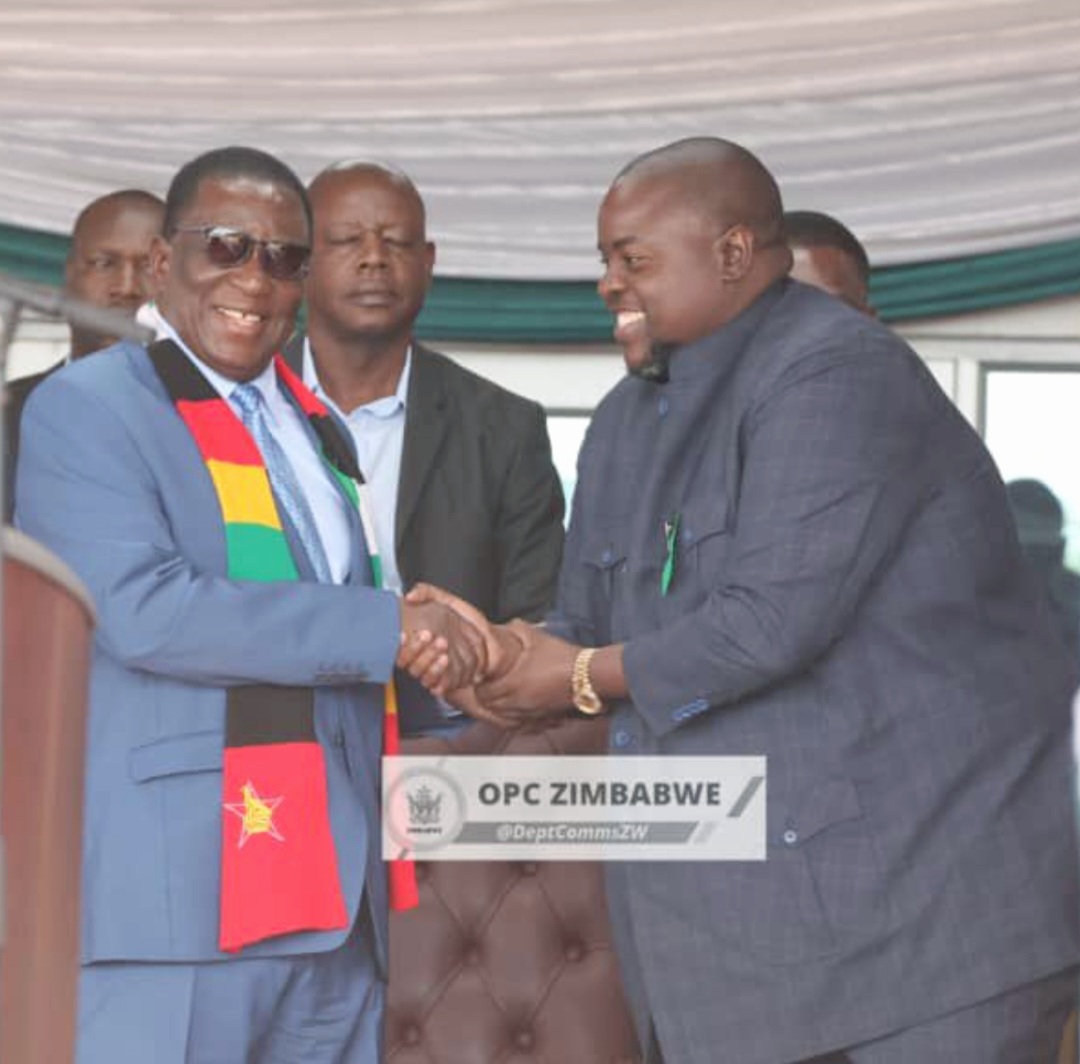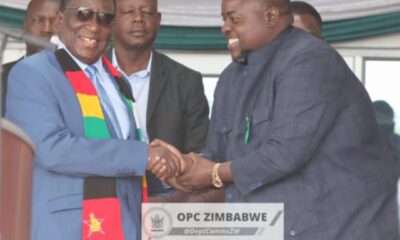
News
How Chivayo tried to scam Musk, world’s richest man
IMC would ensure licences were in place by dealing with Mnangagwa, Information Communication Technology (ICT) minister Tatenda Mavetera, Postal and Telecommunications Regulatory Authority of Zimbabwe (Potraz) officials and other key stakeholders to secure exclusive Starlink rights.
Published
1 year agoon
By
NewsHawksNATHAN GUMA
ZIMBABWEAN dodgy businessman Wicknell Chivayo tried to leverage his proximity to President Emmerson Mnangagwa to con Tesla and SpaceX chief executive Elon Musk – the richest man in the world – into giving him an exclusive money-spinning Starlink deal to provide its services to the local market, but his ill-conceived project fell through, a new investigation by The NewsHawks reveals.
Chivayo wanted a Starlink contract to sell its hardware, kits and provide services to the local market as the exclusive official authorised one-stop reseller, a financial bonanza for him.
The investigation, which draws from fresh documents, messages, voice notes and interviews, reveals the full dimensions of Chivhayo’s project — its intricacies and matrices — that would have given him multi-millions in a politically captured market.
The strategy was:
- Register a purported communications company; get a top-notch technology expert;
- Secure Presidential buy-in and support for an exclusive deal;
- Prevail on the Information Communication Technology minister to secure her support;
- Steamroll Potraz and get a special licence as an internet service provider with the sole rights over Starlink in Zimbabwe.
After that, Chivayo would then replicate the model in Uganda and Tanzania for him to similarly capture those markets.
The investigation shows Chivayo started the process in earnest in way back March, shuttling between the United States, Zimbabwe, Uganda and Tanzania.
After initial local consultations, Chivayo travelled to the US earlier this year and sought to enlist the support of American influencers, including a music rapper Rick Ross, at a meeting in Miami, Florida, on 21 March.
A well-informed source told The NewsHawks: “Chivayo was in the United States, in New York, around 17-20 March. He then flew to Maimi around 20 March.
On 21 March, his chauffeur picked him up from the five-star Ritz-Carlton, South Beach, Hotel to meet with influencers, including music star Rick Ross, and his friends.
“During that meeting, Chivayo enquired about Starlink and how he could secure exclusive rights in Zimbabwe.
“It turned out noone was was really able to facilitate that, but they suggested that he should get a consultant to do that for him. Names were suggested and among those a professional named Frederick Griffin appeared to be the kind of a person Chivayo had been looking for.
“So Hugh Cummingham, his chauffeur, got in touch with Griffin as they know each other, who is chief finance officer and president of GIS Financial Group.
“The following day, on 22 March 2024, Griff in spoke to Chivayo. Consequently, they agreed to work on an application for Starlink, starting the process afresh as it was not professionally done Griffin reworked it and produced professional documents.
“Later, Chivayo and Griffin signed an agreement for the provision of financial advisory and business consulting services on 20 May. Chivayo signed on behalf of IMC Communications (Pvt) Ltd, which is based on 18th Floor, Karigamombe Centre, 53 Samora Machel, Harare, as its chief executive, while Griffin signed for his company, GIS, located at No. 4696, Plantation Oaks Boulevard, Orange Park, Florida, 32065. T he agreement, together with the busines plan and the final proposal, were to “pursue an exclusive partnership with Starlink Services LLC, a wholly owned subsidiary of American aerospace company SpaceX to ensure IMC becomes its exclusive agent in Zimbabwe”.
For its services, GIS charged US$10 000 upfront, US$50 000 as the main fee and a US$15 000 success fee.
IMC would ensure licences were in place by dealing with Mnangagwa, Information Communication Technology (ICT) minister Tatenda Mavetera, Postal and Telecommunications Regulatory Authority of Zimbabwe (Potraz) officials and other key stakeholders to secure exclusive Starlink rights.
With the President’s support, Chivayo was sure he would also steamroll all other key players into supporting his ambitious project. Information pulled together from various sources shows that to raise the stakes, Chivayo claimed in his proposal that IMC was a well-established technology company generating about US$5 million a month, usually with a net profit of US$1.5 million.
His proposal to Starlink suggests a revenue sharing model of 60% Starlink and IMC Communications 40%.
Starlink would provide everything from infrastructure, skills and supplies, while IMC would secure licence arrangements and political protection, and for that only get 40% of revenues, which would include subscription fees.
This is what Chivayo was bringing to the table: a licence and political protection. Chivayo’s company, which would also benefit form knowledge, skills transfer and innovation, would be paid quarterly.
In the process, the Intratrek boss promised to pay a whopping US$20 million to US influencers a month for the deal.
He did not explain where he would get the money from, but he had bigger Starlink plans across several countries which he disclosed to his American contacts during negotiations. Still, his promise to pay influencers US$20 million a month left everybody wondering whether that was possible from Starlink revenues alone.
This means Chivayo expected to make a windfall, well over US$20 million a month if he was going to be paying US$20 million monthly for advisory services. After intense consultations and lobbying, Chivayo went into overdrive to secure the deal.
On 5 May, he was back in the US for a graduation ceremony of his younger sister Glendour Kudzayi Moyo at Rosen College of Hospitality Management, an academic college of the University of Central Florida located in Orlando, Florida.
He had arrived there on 4 May. Chivayo took that opportunity to make further contacts with his consultants and friends over the Starlink deal.
On 19 May, Chivayo upped the ante and went to see Mnangagwa at his Precabe Farm, Sherwood, Kwekwe, as he pulled out all the stops to succeed.
There he agreed with the President that Zimbabwe would license Starlink, but IMC would be its exclusive service provider. With Mnangagwa and Mavetera on his side and Potraz overridden, Chivayo was now ready to talk to Musk.
Musk’s sprawling business empire — spanning everything from electric vehicles and social media to space rockets and miniature brain implants — may soon make him the world’s first trillionaire.
The South African-born Tesla boss is already the richest person on the planet, with a fortune of about US$250 billion. So on 24 May, a meeting was organised between Chivayo, Mavetera and Musk.
“Five days after he secured Mnangagwa’s support at his Midlands farm, Chivayo then organised a meeting between the minister Mavetera, Musk and himself. It was scheduled for 8pm Zimbabwean time on Friday 24 May 2024,” a well-placed source said.
All the while Chivayo had made it appear like he does not have any relations with Mavetera so that Musk and his team would not raise alarm.
He did not want Starlink executives to know he was pushing for a patronage-based arrangement using the President and the minister as his trump cards.
Consultants and advisers were told to pretend that they are not aware of his relationships with Mnangagwa and Mavetera whom he refers to as “my sister”.
Chivayo refers to Mnangagwa as a “father” and the President calls him “son”.
This has led to the now common and hilarious colloquial phrase in local parlance “ndakachibata kuti dzvii (Shona for I have a firm grip on the situation), suggesting he has captured the President.
After that Chivayo told his team that the meeting with Musk’s team went on “very well” and he was “very happy”.
Things started moving faster after that.
The following day, 25 May, Africa Day, on a Saturday, Mnangagwa unilaterally issued a statement on a weekend, saying he had licensed Starlink in Zimbabwe, with IMC having locked the deal for exclusive service provision rights.
In a surprise announcement, the President, through his X (formerly Twitter) platform, said:
“I’m pleased to announce that i have approved the licensing of Starlink by Potraz to provide advanced internet and related digital processing services in Zimbabwe through its sole and exclusive local partner, IMC Communications (Pvt) Ltd.
Presidengt Emmerson Mnangawa
“Starlink is a Low Earth Orbit (LEO) satellite operator wholly owned by global conglomerate SpaceX led by prominent multi-billionaire Elon Musk.
“The entry by Starlink in the digital telecommunications space in Zimbabwe is expected to result in the deployment of high speed, low cost, LEOinternet infrastructure throughout Zimbabwe and particularly in all the rural areas.
“This will be in fulfillment of my administration’s undertaking to leave no one and no place behind. The investment confidence expressed by Starlink in Zimbabwe’s telecommunications infrastructure also dovetails with the 2nd Republic’s mantra ‘Zimbabwe is open for business’.
“I encourage more investment by foreign conglomerates in Zimbabwe as we are an investment destination of choice. I take this opportunity, on behalf of the Government of Zimbabwe, to congratulate IMC Communications (Pvt) Ltd and Starlink on this commendable milestone aimed at revolutionising the digital and communications technology landscape in Zimbabwe.
“Investments of this magnitude and strategic importance represent the cornerstone for achieving the 2nd Republic’s objective of having a fully digitalized, upper-middle income economy by 2030.”
That meant Zimbabweans would ideally go through Chivayo’s company to officially get Starlink hardware and its services.
Although it would have been difficult to enforce that contrived monopoly in an open market situation, government departments, state institutions, public servants and the private sector would have been commandeered to go through his company.
Most private sector companies and individuals, which or who always want to be seen as politically correct and curry favour with government, would have felt compelled to go through him. With that breakthrough and the deal sealed — or so it appeared — Chivayo was ready to travel to Uganda and Tanzania to go and replicate the model.
His business model is based on influence peddling, name-dropping, leveraging personal connections and networks, utilising reputation and social status, lobbying and donations to gain access whenever it is conveniently needed, hardly on merit, innovation and competency.
He did not waste time after Mnangagwa’s approval.
His next stop was Kampala, Uganda, to meet President Yoweri Museveni on 29 May.
While there, he visited Museveni at State House in Entebbe and met him at State House in the capital to lobby for a Starlink licence to provide highspeed low-cost satellite internet services as he had done in Zimbabwe.
A day after meeting Museveni, Chivayo wrote on social media: “I was most honoured yesterday after paying my f irst courtesy visit to H.E. General Yoweri Kaguta Museveni, the President of the Republic of Uganda at State House in Kampala…
“I was also fascinated by the President’s comprehension of the fundamental role that ICT plays in the 21st century in building a digitally-enabled society through technology-based empowerment. Under President Museveni, the Ugandan Government has developed a digital Uganda vision as part of its vision 2040, under which modern technology is set to achieve the goals of universal inclusion, sustainable development and economic progress.
“This economic vision is well aligned with H.E. President E.D. Mnangagwa’s Vision 2030 objective of achieving a fully digitalised upper-middle income economy by 2030 in Zimbabwe.
“I was most delighted to note Uganda’s interest in welcoming investors in the digital space in order to improve internet penetration in the country.
“Uganda is a strategic market in which substantial investment in digital technologies can be deployed in order to improve 5G internet accessibility at highly competitive prices.
“I have the greatest confidence that my visit and fruitful engagements shall yield into multi-million dollar investment in the telecommunication and digital technology sector in Uganda.”
From Uganda, Chivayo flew into neighbouring Tanzania to the south on the eastern seaboard of the Indian Ocean to meet President Samia Suluhu Hassan on 31 May.
After the meeting, Chivayo posted:
“It was a remarkable pleasure and delightful opportunity to meet the first ever female President of the United Republic of Tanzania, Her Excellency Dr. Samia Suluhu Hassan.
“What I found most intriguing about Mama Samia is her unique ability to blend a warm motherly character with robust State authority.
“Full of charisma and an attentive character, the President charmed me with her meticulous understanding of investment financing, infrastructure development and the pivotal role of technology in the transformation of Tanzania into a digital economy.”
This was a classic demonstration of Chivayo in action on a patronage path, leveraging political networks and influence peddling.
Chivayo has a number of lucrative deals, particularly state tenders and contracts in Zimbabwe, that he has secured due to his proximity to Mnangagwa and ministers.
At the moment, he is still enjoying his US$100 million Zimbabwe Electoral Commission (Zec) jackpot that has been his biggest windfall yet.
Overwhelmed by the fortune, he has now spent over US$3 million in a bizarre car and cash donations spree.
After stopping the donations following the Zec scandal exposure by The NewsHawks and realising he will not be arrested as the Zimbabwe Anti-Corruption Commission had threatened, he is now back at again — donating and enjoying the proceeds of corruption with impunity.
The Zec deal was wrapped in high-profile corruption, kickbacks and bribery, as well as money laundering.
It involved Mnangagwa’s close allies, including Chief Secretary to the President and Cabinet Martin Rushwaya, Zec chair Priscilla Chigumba, Central Intelligence Organisation Director-General Isaac Moyo, the President’s daughter Chido, detained businessmen Mike Chimombe and Moses Mpofu, local gold baron Pedzisayi “Scott” Sakupwanya and Chivayo, among others.
By Chivayo’s own account, the Zec deal has changed his fortune and life 10 times over. T he Starlink deal was no different and could have steered him towards his dream — to become a billionaire — the investigation shows.
After that, Chivayo started advertising Starlink services in Zimbabwe through his social media on 11 June, promising to revolutionise internet service provision in the country and change society.
The following day — on 12 June — IMC, purporting to be “the exclusive distributor of Starlink services in Zimbabwe”, appointed information technology expert and former ZOL executive Denny Marandure as its managing director.
“Mr Marandure brings a wealth of experience, knowledge, expertise and skills in the ICT industry and is well known for his role as ZOL chief executive officer (the Internet Service Provider of Liquid Intelligent Technologies), where he led the most successful roll out and adoption of Fibre-to-thehome in Zimbabwe,” IMC said.
Marandure was later quoted in the media as saying IMC was raring to go as the President would have wanted Starlink services to be offered before the Southern African Development Community summit on 17 August in Harare.
He claimed IMC was only waiting for the signing of “reseller agreements” before it hits the market.
Just as it appeared like pieces of the puzzle were f inally coming together neatly, Potraz rained on his parade and spoiled the party.
Soon afterwards, things started unraveling for Chivayo after putting such an indefatigable effort to secure the deal. In July, Potraz said no company has been given the exclusive right to offer Starlink services in Zimbabwe.
The country, Potraz added, simply has no such provisions in its telecommunications laws. Potraz director-general Gift Machengete told the state-controlled media:
“In our licence categories, we have no licences for exclusivity. Our licences are not technology-specific, in this case, the service that we are licensing is internet service provision.
“This means that anyone who has our licence, if it is an ISP, that person can go to Starlink, that person can go to Liquid, that person can use any technology.”
He said the regulator had in the recent past received, processed and granted several licences to prospective operators.
This is in addition to multiple other licences Potraz has already granted and the licensees are operating in Zimbabwe like DFA Zimbabwe, ZOL, Utande, Powertel, Liquid Intelligent and TelOne, to name but a few.
In mid-July, Machengete confirmed IMC has now been given an Internet Service Provider (ISP) licence.
“They made an application for what is called ISP or internet service provider and we approved it,” he said.
Marandure, speaking at cross-purposes with his boss Chivayo, who had pulled out all the stops to get exclusive Starlink rights but dismally failed to get that, said Zimbabwe was “set to witness a mammoth digital revolution”.
“Competition is healthy, and IMC will no doubt increase competition and innovation in the Zimbabwe internet market, which should lead to lower prices and better quality for consumers,” he said.
As the drama unfolded, Starlink went live in Zimbabwe on 6 September. Zimbabwe joined the list of other African countries to have Starlink services after Botswana and Ghana.
Starlink is also active in Benin, Nigeria, Rwanda, Malawi, Mozambique as well as Zambia, Kenya, Madagascar, Sierra Leone, South Sudan and Eswatini.
Musk recently met South African President Cyril Ramaphosa on the sidelines of the United Nations General Assembly summit in New York last month to discuss if Starlink will soon launch south of the Limpopo.
It is offering two residential packages for customers: standard package: US$50 a month (hardware US$350) and mini package: US$30 per month (hardware US$200).
There are currently three licenced Starlink services providers in Zimbabwe: Zodsat, IMC and Aura Group. Contacted for comment of these issues, Mavetera told The NewsHawks:
“The DG of Potraz (Machengete) is on record saying that for now only three operators are cleared as agents of Starlink in Zimbabwe. We stand guided by that announcement.
“The last communication again is saying more dealers will also be cleared soon as long as these companies agree with Starlink to be their dealer, on this neither the ministry nor the regulator have control on Starlink agreements with dealers or agents. The ministry does not license operators in the telecommunications sector nor does it assist players to get licenses from the regulator.
“Our role as a ministry is to give policy formulation and oversight, We continue to thank our President H.E Dr E.D Mnangagwa again for the policy direction he gave us on allowing Starlink to come to Zimbabwe. He has the vision we implement through our regulator who gives licenses. When Potraz licenses a player to operate in Zimbabwe, it is up to the operator to deploy services when the operator is ready to do so and within the parameters set out in the license issued by Potraz. Unfortunately, i cannot speak on behalf of IMC or any other player with regard to their launch of services date.”
Asked about her presence at Aura’s recent launch, Mavetera said:
“As for my attendance of the Aura launch: the ministry is like a parent who attends all milestone events of all his/her children, that is telecoms players.This is why in one week we will attend an event sponsored by Econet, eg launch of cybersecurity awareness month and also attend an event sponsored by NetOne, eg 5G connectivity launch or any other player. We will continue to support any developments that promote and increase access to ICTs for the general populace of Zimbabwe.”
Chivayo was not available for comment. He did not answer questions sent to him.
You may like




















